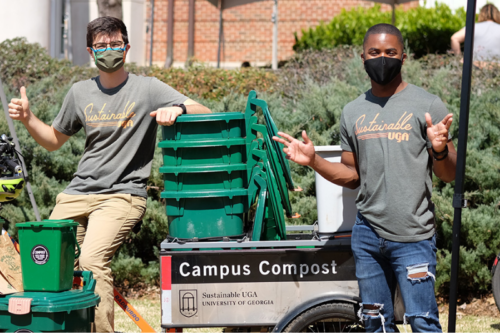


In Spring 2025, UGA Dining Services introduced Raccoon Eyes AI as a pilot program at Village Summit.
Raccoon Eyes is an innovative technology that enhances the dining experience and helps reduce food waste.
Using advanced AI and computer vision, the system analyzes plate selections to identify patterns in food waste, empowering UGA to make informed decisions for sustainability, monitor and reduce waste, and streamline processes.
Students can also play a role by being mindful and only taking what they will eat, helping to minimize leftovers.
Raccoon Eyes ensures efficiency, accuracy, and a more sustainable campus dining experience.
 Implemented in 2024, the Sustainability Ambassador Program appoints and trains Dining Services staff members to help ensure proper recycling and composting procedures are followed in the dining commons.
Implemented in 2024, the Sustainability Ambassador Program appoints and trains Dining Services staff members to help ensure proper recycling and composting procedures are followed in the dining commons.
Improper recycling and composting procedures can impede the effectiveness and efficiency of sustainability efforts, leading to clogged recycling machines or even entire shipments being sent to the landfill.
Our Sustainability Ambassadors prevent these hinderances by checking composting and recycling bins throughout the day, ensuring that cans are clean, recycling is properly sorted, and composting is free of gloves or other plastic.
Each semester, the Sustainability Ambassadors tour one of Athens-Clarke County’s waste facilities (e.g. the Recycling Facility, the landfill, the Center for Hard to Recycle Materials) to gain a broader understanding of waste management in Athens-Clarke County and beyond.
 Dining Services, in partnership with the Facilities Management Division and the Office of Sustainability, has diverted food waste from the landfill since 2014. This food waste is pulped and transported to the Athens-Clarke County Commercial Composting Facility, where it is processed into a nutrient rich soil amendment.
Dining Services, in partnership with the Facilities Management Division and the Office of Sustainability, has diverted food waste from the landfill since 2014. This food waste is pulped and transported to the Athens-Clarke County Commercial Composting Facility, where it is processed into a nutrient rich soil amendment.
Dining Services has been a long-time campus advocate of environmental sustainability concepts, including recycling.
Dining Services also composts food waste from its dining commons and retail operations and has substantial reduction efforts.
Reducing food waste on campus is a top priority for Dining Services, in partnership with the UGA Office of Sustainability and UGA Facilities Management Division.
Dining Services has reduced its yearly water usage by 2.05 million gallons of water through conservation efforts. Dining Services also composts food waste from its dining commons and retail operations and has substantial recycling efforts.
 In all of our facilities we:
In all of our facilities we:
Our dining commons locations
 All of our retail locations use eco-friendly disposable service ware.
All of our retail locations use eco-friendly disposable service ware.
Dining Services’ locations in Tate Student Center
The Water Bottle Reclamation Initiative works with campus and community partners to recondition reusable water bottles and keep them out of the landfill.
Campus partners donate abandoned water bottles to the Office of Sustainability from lost-and-found locations across campus. These water bottles are then sent to Dining Services where they are washed before being redistributed to partners like the UGA Swap Shop, UGA Auto Center, and community organizations like The Backpack Project.
This program saves resources through reuse and salvages items that would otherwise be landfilled.
Dining Services is also a major contributor to both the Food Bank of Northeast Georgia and Full Plate. These organizations ensure that our surplus food is distributed to human-service agencies in the Athens area. Dining Services was recognized with the 2003 Community Champion award for its support feeding people experiencing homelessness in the community.

UGA Dining Services is able to donate unused ingredients and cans that cannot be used in campus locations to the Food Bank of Northeast Georgia. The food bank recovers donated and surplus food and distributes it to human-service agencies that operate emergency shelters, food pantries, after-school programs and soup kitchens in the Athens area.

For many years, UGA Dining Services has partnered with ACTION Inc.’s Full Plate program through food donations. UGA is able to donate prepared foods that have not been served. Full Plate distributes food to local charities that operate emergency shelters, food pantries, after-school programs and soup kitchens in the Athens area.
Find Us:
790 South Lumpkin Street
Athens, GA 30602
Contact Us:
dining@uga.edu
706-542-1256